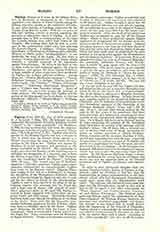

Vigilius, BISHOP OF TAPSUS, in the African Province of Byzacena, is mentioned in the “Notitia” appended to the History of Victor Vitensis, among the bishops who were present at the conference of Catholic and Arian bishops in Carthage summoned by the Vandal King Huneric in 484. With the exception of this fact nothing certain is known regarding the previous or subsequent career of Vigilius. It is conjectured that he fled to Constantinople at the time the Catholic bishops were exiled from Africa by the Vandals. His writings show that he took an active part in the controversies which were then agitating the Eastern Church. A dialogue, “Contra Arianos, Sabellianos, et Photinianos; Athanasio, Ario, Sabellio, Photino et Probo judice, interlocutoribus”, is undoubtedly the work of his hands. He also wrote a treatise, “Contra Eutychetem”, in five books, which contains a valuable summary of the arguments against Eutychianism. He refers in this book to two or three works he had composed against the deacon Maribadus, and against the Arian bishop Palladius. A large number of other works have been attributed to Vigilius, but without sufficient evidence. Among these are: “Contra Maribadum Arianum”; “Contra Palladium Arianum”; a dialogue “Contra Arianos”; twelve books “De Trinitate”; “Contra Felicianum Arianum”; “Solutiones objectionum Arianorum”, and a “Collatio cum Pascentio Ariano”. Many of these works are preserved among the writings of other authors. The hypothesis that Vigilius was the author of the Quicumque has been shown to have no foundation (Kiinstle, “Antipriscilliana”, Freiburg, 1905, 109).
PATRICK J. HEALY

